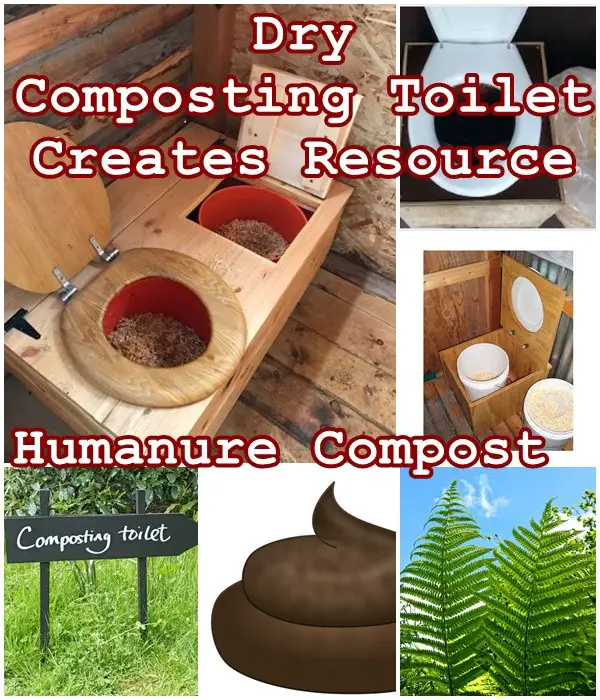A Dry Composting Toilet Creates Resource of Humanure Compost on Homestead has in the last decade has slowly lurched into the mainstream. People have embraced the “Garden To Table” movement but have not taken to heart the human waste composted into a fertilizer concept. On a personal note: I am not sure if I can follow through BUT I am open to listening and learning.

Yes, our solid waste can actually be converted into something useful. That seems ridiculous, but it’s much how we use cow manure on farms. It comes in the form of a dry composting toilet (DCT), which collects our waste to be recycled organically. No water is needed, no digging of holes necessary, and no outhouse located far away with the use of chemicals.
A DCT is perfect for those who live on a farm and off the grid and lets you use water for other things. And, it doesn’t even smell instantly, unless you don’t clean the bottom after a few days. In a DCT, the waste is covered by carbon and nitrogen, controlling the smell and risk of any disease.
Just use the material first, like leaves, wood chips, and pine needles, use the potty, and put more of that cover material on top. Have a five-gallon bucket collecting everything until it’s three-quarters full before removing it from below and dump in the compost pile, something that is usually done three times a week for a family of three. This compost coming from our waste is perfect as a source to grow plants and trees just have the right carbon-nitrogen ratio and temperature to make it work the best.
Living in a city would make you flush it all down into the overflow sewer and wastewater. The farms have no problem reusing it for necessary pasture. It is common in the rural, gridless areas, and it is very Eco-friendly.
A composting toilet is a type of dry toilet that treats human excrement by a biological process called composting. This process leads to the decomposition of organic matter and turns human excreta into compost-like material but does not destroy all pathogens. Composting is carried out by microorganisms (mainly bacteria and fungi) under controlled aerobic conditions.[2] Most composting toilets use no water for flushing and are therefore called “dry toilets”.
In many composting toilet designs, carbon additives such as sawdust, coconut coir, or peat moss is added after each use. This practice creates air pockets in the human excreta to promote aerobic decomposition. This also improves the carbon-to-nitrogen ratio and reduces potential odor. Most composting toilet systems rely on mesophilic composting. Longer retention time in the composting chamber also facilitates pathogen die-off. The end product can also be moved to a secondary system – usually another composting step – to allow more time for mesophilic composting to further reduce pathogens.
Composting toilets, together with the secondary composting step, produce a humus-like endproduct that can be used to enrich soil if local regulations allow this. Some composting toilets have urine diversion systems in the toilet bowl to collect the urine separately and control excess moisture. A “vermifilter toilet” is a composting toilet with flushing water where earthworms are used to promote decomposition to compost.
Composting toilets do not require a connection to septic tanks or sewer systems, unlike flush toilets. Common applications include national parks, remote holiday cottages, ecotourism resorts, off-grid homes and rural areas in developing countries as quoted by Wikipedia.Com https://en.wikipedia.org/wiki/Composting_toilet
Click here to read about Dry Composting Toilet Creates Resource of Humanure Compost on Homestead:
https://www.motherearthnews.com/homesteading-and-livestock/turn-waste-into-a-resource-with-human-manure-zbcz1611
As an added bonus, You may want to take a peek at the article “How To Use Pee In Your Garden”:
https://thehomesteadsurvival.com/pee-garden/
Click here to read about how to Build a Composting Toilet with Urine Separation Project:
https://thehomesteadsurvival.com/build-a-composting-toilet-with-urine-separation-project/


